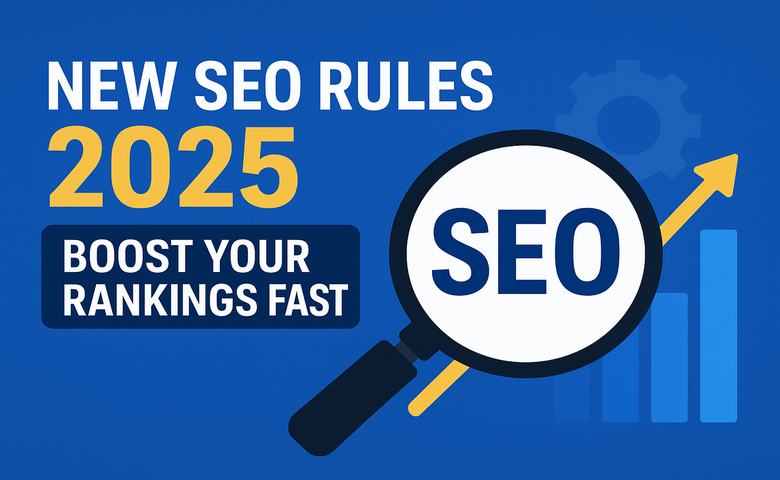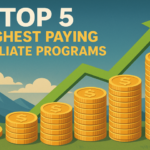Search Engine Optimization (SEO) is changing faster than ever. With Google’s latest updates in 2025, businesses, bloggers, and digital marketers must rethink their strategies to stay visible in search results. The focus is no longer just on keywords but on value, trust, and experience.
Here, we’ll explore the new SEO rules of 2025 and how you can apply them to boost your rankings fast while aligning with Google’s E-E-A-T framework.
Table of Contents
1. Content Quality Over Quantity
Gone are the days of pumping out dozens of short articles. In 2025, Google rewards in-depth, helpful, and original content.
What to Do:
- Write content that solves real user problems.
- Use case studies, data, and personal experience to add credibility.
- Aim for topic authority rather than just keyword stuffing.
2. User Experience (UX) is a Ranking Signal
Google’s algorithm now looks closely at how users interact with your site. If people quickly leave (high bounce rate), your rankings will drop.
What to Do:
- Ensure fast loading speed (under 2–3 seconds).
- Mobile-first design is non-negotiable.
- Use clean navigation, clear headings, and interactive visuals.
3. AI-Driven Search & Semantic SEO
With Google using AI-powered search (SGE – Search Generative Experience), traditional SEO is evolving. AI pulls direct answers from your content, so context and intent matter more than keywords alone.
What to Do:
- Focus on semantic SEO – answer related questions around your topic.
- Use conversational keywords and long-tail queries.
- Add FAQs, structured data, and schema markup for better AI visibility.
4. Author Authority & Personal Branding
Google now places weight on who is behind the content. Anonymous or low-credibility authors are less likely to rank.
What to Do:
- Use author bios with credentials and expertise.
- Build your personal brand on LinkedIn, YouTube, and other platforms.
- Get mentions, backlinks, and guest posts from authoritative sites.
5. Video & Multimedia SEO
Video is dominating search results. In 2025, Google often shows YouTube videos, shorts, and multimedia content above written blogs.
What to Do:
- Create YouTube videos that complement your blog posts.
- Use video schema markup so search engines can index it.
- Add infographics, podcasts, and interactive elements to diversify content.
6. Trust Signals & Brand Reputation
Google emphasizes trust and credibility more than ever. Sites with poor reviews, spammy backlinks, or misleading content will struggle to rank.
What to Do:
- Collect genuine reviews and testimonials.
- Use secure HTTPS, clear contact info, and privacy policies.
- Build backlinks from trusted, niche-relevant sources.
The new SEO rules in 2025 are clear: focus on quality, authority, and trust. Instead of chasing shortcuts, align your strategy with Google’s E-E-A-T update:
Experience – Share real-world insights.
Expertise – Demonstrate subject mastery.
Authoritativeness – Build a strong brand and presence.
Trustworthiness – Be transparent and reliable.
If you follow these principles, you’ll not only boost your rankings fast but also future-proof your site against upcoming algorithm changes.
FAQs:
Q1. What are the major SEO changes in 2025?
In 2025, Google is focusing more on EEAT (Experience, Expertise, Authoritativeness, Trustworthiness), AI-driven search (SGE – Search Generative Experience), user intent optimization, and faster website performance. Content that provides real value and authenticity ranks higher.
Q2. How does Google EEAT impact SEO in 2025?
EEAT is no longer optional—it’s essential. Google now favors websites that show real author experience, expert credentials, trustworthy sources, and clear author information. Sites without credibility signals may lose rankings.
Q3. Is AI-generated content allowed in 2025?
Yes, but only if it’s edited, fact-checked, and provides real value. Google penalizes low-quality, automated, or duplicate AI content. Human expertise and unique insights are necessary to boost rankings.
Q4. How can I optimize for Google’s SGE (Search Generative Experience)?
To rank in AI-driven search results, focus on structured content, FAQs, conversational keywords, and schema markup. Providing clear answers to user queries improves your chances of being featured in AI summaries.
Q5. Do backlinks still matter in 2025?
Yes, but quality over quantity. Google gives more weight to backlinks from authoritative, niche-relevant websites. Spammy or irrelevant backlinks can harm rankings.
Q6. What technical SEO factors are crucial in 2025?
Core Web Vitals, mobile-first indexing, site speed, voice search optimization, and AI-driven structured data remain critical. Also, zero-click searches and rich snippets make schema more important.
Q7. How important is video SEO in 2025?
Very important. With YouTube, Shorts, and Google’s integration of video results, video content with optimized titles, transcripts, and captions can significantly boost visibility.
Q8. How can small businesses adapt to SEO changes in 2025?
Small businesses should focus on local SEO, Google Business Profile optimization, long-tail keywords, reviews, and trust signals. Authentic, localized content helps compete with larger sites.
Q9. Will keyword research still matter in 2025?
Yes, but search intent matters more than exact keywords. Instead of keyword stuffing, optimize for natural language, questions, and conversational search queries.
Q10. What is the fastest way to boost rankings under new SEO rules?
- Publish high-quality, expert-driven content
- Optimize for mobile & speed
- Build author credibility & trust signals
- Use schema markup for AI search
- Earn quality backlinks
- Focus on user intent & engagement
Also Read: Latest Updates in SEO 2025















